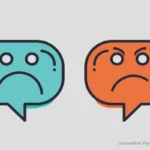
Every relationship is always a matter of two. Also toxic relationships. That means that, in a way, we too have done our part so that this relationship reaches a point where it is unsatisfactory or downright harmful to us. There are certain ways of thinking that can keep us trapped in a toxic relationship, preventing us from severing the bond that binds us to that person, even though we are aware that that bond is damaging us. Understanding the biases in our assessment of what happens to us will help us take the final step.
How do we contribute to a toxic relationship through our biases?
1. Status quo bias
An old saying goes that better known evil than good yet to know. Conventional wisdom reinforces the idea that it is preferable that things remain as they are unless they are truly terrible. We are victims of the status quo bias, an irrational preference for the current situation.
In practice, when we establish a baseline, it becomes our point of reference and we perceive any change as a loss or a threat, even if it is positive. In fact, even in toxic relationships that are far from ideal, we can find a precarious balance.
When we adopt this mindset we prefer continuity to disruption, a known past to an uncertain future. We choose the certainty of misfortune over the misfortune of uncertainty. We think that we will not find anyone better or we will try to comfort ourselves by thinking that it is actually not as bad as it seems.
2. Loss aversion
We hate losing something when we’ve already invested in it, whether it’s money, time, or effort. That’s another reason we get stuck in toxic relationships. In fact, it is one of the main reasons why marriages that have built a life in common, but do not really have anything in common, do not break down.
When we apply this mentality to relationships we can become deeply unhappy, clinging to a relationship that no longer satisfies us, just because we don’t want to “throw away” everything we have “built together.”
In this way we end up focusing solely on losses, without realizing how much we could gain. There is no doubt that 5, 10 or 20 years of relationship is enough and there will be shared stories and a lot of emotional investment, but when a relationship is toxic, ending it is more beneficial than harmful.
3. Confirmation bias
We like to think that we make few mistakes and we make good decisions. That thought comforts and reassures us. Therefore, it is not difficult to fall into what is known as a confirmation bias. It is the tendency to favor the data and clues that confirm our beliefs while we dismiss or ignore those that deny it.
This phenomenon is intensified even more in those contents of emotional nature, such as relationships. When we do not want to end a relationship, probably because there are still strong emotional ties, we will tend to exaggerate the positives and minimize the negatives.
In fact, many people who are abused in their relationships justify their partner saying that he “is actually a good person.” When love still exists, it is difficult to remove the blindfold to see reality as it is, so sometimes we prefer to focus only on the positive reinforcements we receive, such as an unexpected gift or detail. That keeps us excited, thinking that change is just around the corner, when it probably isn’t.
4. False Consensus Effect
Our mentality is not formed solely on the basis of our experiences, but we also take note of what is happening around us. In fact, we continually look outside to compare what happens to us with what supposedly happens to others. However, in that comparison we are not objective.
We tend to think that our opinions, beliefs, values and habits are more widespread among the rest of the population than they really are. This is known as the false consensus effect and it can become one of the reasons we get stuck in toxic relationships.
If we develop this mindset, we will believe that it is okay to endure that relationship because, after all, most relationships are like this. We can think that “all couples argue”, “that all mothers are controlling” or that “it is normal for our partner to be possessive”. In this way, we normalize the situation of abuse that we are living, thinking that it is usual, when it is not.
5. Self-blame
Guilt is one of the worst shackles that keep us tied to toxic relationships. There are people who have a highly self-blaming mentality or have developed it after years of manipulative dynamics as well as gaslighting.
In these cases, the person is likely to think, “It is not his fault, I am too sensitive” or “I have given him reasons for it.” Generally, these types of thoughts in which the victim assumes the blame are an attempt to justify the other and keep the relationship at an acceptable level, closing the eyes to the abuse.
However, it is important to bear in mind that, although every relationship is a matter of two, there are certain red lines that should not be crossed. And precisely as every relationship is a matter of two, it must be satisfactory for both members. If the relationship is a source of constant discomfort, it may be time to end it. Leaving the known may hurt, but it won’t hurt forever.



